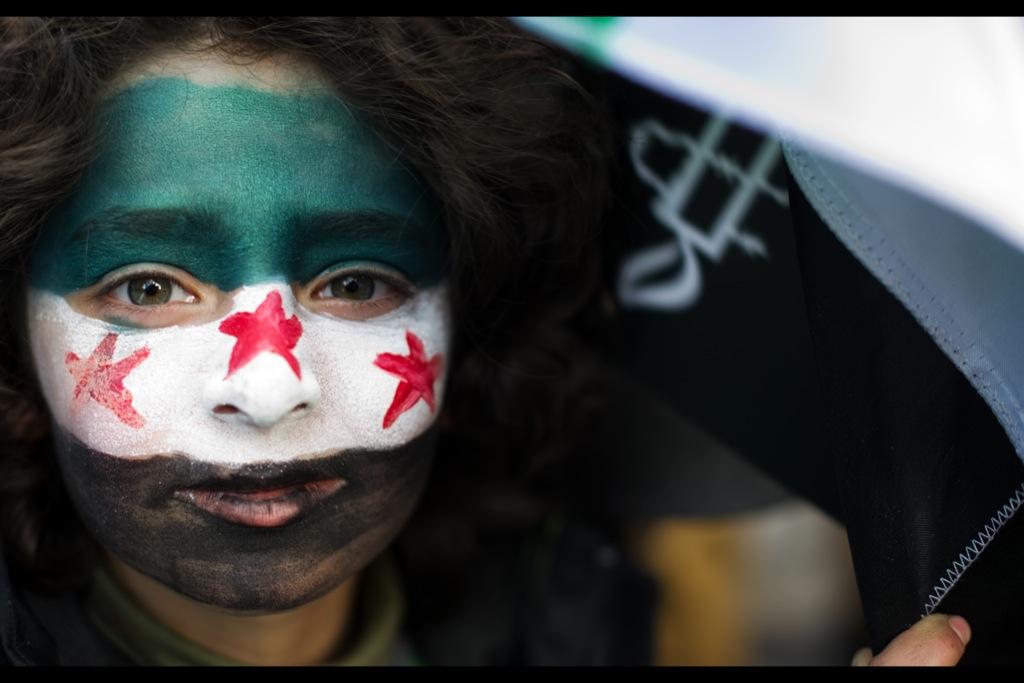Syria: To intervene or not to intervene?
A child with the former flag of Syria painted on his face joins in with the Amnesty International rally in Trafalgar Square, central London on February 11, 2012. The protest was part of an international day of action to show solidarity with protesters in the Middle East and North Africa who are demanding reforms and greater respect for human rights.
As the Syrian revolt approaches the 12-month mark, divisions between Syrians over whether or not to support foreign military intervention to curtail government attacks on civilians and rebels are becoming more pronounced.
Edward Dark, the pseudonym for an anti-regime activist in Aleppo, said most people are in favor of the idea, especially as the death toll continues to rise. The United Nations now estimates that “well over” 7,500 people have so far been killed in the fighting.
"The majority of Syrians support some kind of intervention, preferably led by Arab or Turkish troops, and backed up by NATO,” he said. “There is a sense here that this violence will not stop, and the regime will not halt its bloody crackdown unless it faces tangible action or threats of action."
But, he said, “The question is not what Syrians want, it's what the international community is prepared to do, which at this time is next to nothing."
More from GlobalPost: Syria: How it all began with a couple of kids and a can of spray paint
International powers remain divided over whether to intervene in Syria. Saudi Arabia, Qatar and France are among those that appear to favor the move. Turkey, the United States, Britian and a spate of Arab countries, however, oppose the idea in favor of more sanctions, citing Syria's complex religious and ethnic make-up, as well as the structure of the Syrian regime as impediments to a successful mission.
Rami, a 29-year-old Sunni dentist from the wealthy Malki area of Damascus patently opposes outside intervention and believes most other Syrians would agree.
"Almost no one supports international military intervention — people are totally against it. There are a few though, but they are considered mad to ask for something like that."
A European diplomat in Damascus, who asked not to be named, believes the Syrian regime is aware of the international community's lack of appetite to intervene and believes military involvement is not the solution this time around.
"It [intervention] will certainly play in the hands of the regime and will motivate the regime's armed forces to fight fiercely against the external enemy," he said.
Joshua Landis, the director of the Center for Middle East Studies at the University of Oklahoma and author of the popular blog, Syriacomment, said the willingness to end the violence internationally is understandable.
More from GlobalPost: ‘The Army, The People…’ Egypt’s Continuing Revolution
"But by decapitating the state, the killing will likely increase without a government in waiting ready to step in," he said in an interview. Landis believes foreign intervention could drag Syria into the failed-state category. "Today, that government in waiting has not emerged. There is no military on the ground prepared to substitute for the Syrian army."
The United Nations said it was preparing food supplies for 1.5 million Syrians as part of a 90-day emergency plan should conditions deteriorate further inside the country.
Tellingly, the UN-Arab League special envoy to Syria, Kofi Annan, said Thursday that arming insurgents would lead to more conflict and that the international community needed to be “careful that we don't introduce a medicine that is worse than the disease."
Kevork, an Armenian student from the northern city of Aleppo, said he thought the chance of outside intervention was unlikely.
"If, and only if, there would be any intervention, it mustn't be from only one country, such as Turkey or USA, but a coalition of forces. Otherwise it would be a direct war between the two," he said.
The Arab League observer mission that operated throughout Syria in December and January, meanwhile, failed to induce the regime to stop its crackdown or to bring the opposing sides to a point of negotiating.
More from GlobalPost: Has Israel dodged the regional crisis?
"The Arab League countries are not able to defeat the Syrian army easily on their own, and they are even divided on this matter among themselves," Kevork said.
Syria's unrest is regularly cited as being incomparable to that of Libya's, where NATO's intervention was considered successful. But many are quick to point to the unsuccessful examples of foreign intervention in Afghanistan and Iraq (as the Syrian regime has done) as example of what could happen in Syria, and not to any positive outcome.
The European diplomat said the situation in Syria may not reach a point where outside military intervention is being seriously proposed.
"There is still room for a political solution. There is some evidence that Russia will engage more constructively for a political resolution and might accept a humanitarian version of a United Nations Security Council resolution on Syria."
